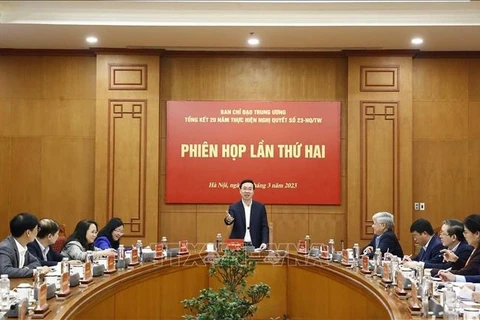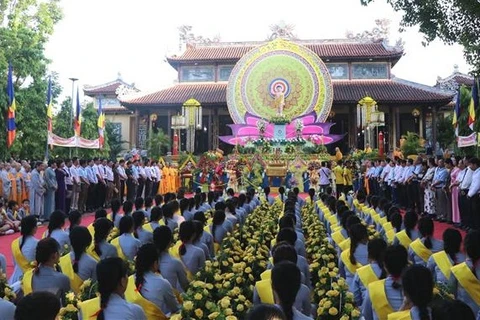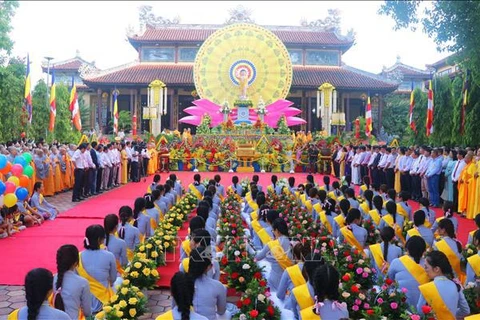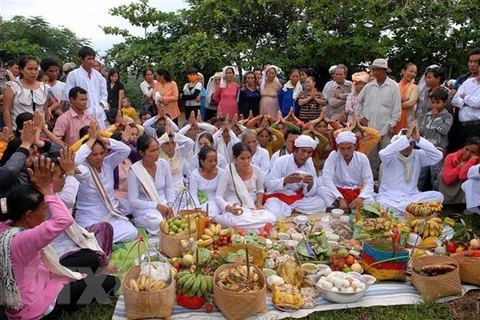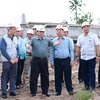 Prime Minister Pham Minh Chinh (R) receives US Secretary of State Antony Blinken in April 2023. (Photo: VNA)
Prime Minister Pham Minh Chinh (R) receives US Secretary of State Antony Blinken in April 2023. (Photo: VNA) Hanoi (VNA) – Images of foreign leaders from major countries strolling Vietnam’s streets and stopping by roadside restaurants to try street food are becoming more and more common for Vietnamese people.
Even in the world's media, those images are becoming very “normal”.
Delicious and simple meals in a peaceful atmosphere
In mid-April, Secretary of State Antony Blinken made his first visit to Vietnam as the head of the US’s diplomatic service. The visit took place in the context that the US and Vietnam are celebrating the 10th anniversary of their bilateral Comprehensive Partnership.
Despite his hectic work schedule, on April 15 evening, Blinken had a relaxing time to go for a walk and have dinner in Hanoi. He entered Binh Minh jazz club at No.1 Trang Tien street in the very heart of Hanoi, enjoying music with an old friend - former Deputy Minister of Foreign Affairs Pham Quang Vinh.
After that, he and some others had dinner at Com Tay Cam (Rice served in a claypot) restaurant located in Trang Tien alley near the Hanoi Opera House. A meal with local dishes such as shrimp spring rolls, steamed rice, and shrimp simmered with coconut sauce were selected and ordered in advance by the Secretary of State. Blinken also ordered other dishes when enjoying his meal at the restaurant.
He then shared his experiences on Twitter: “You can't visit Vietnam and not sample the food. Vietnamese cuisine has some of the freshest flavours and we have seen its influence across the US in our own restaurants. Thank you to Com Tay Cam for allowing me to sample your incredible food.”
“Qua ngon! (So delicious)”- that's Blinken's comment about that meal, in Vietnamese!
 Blinken's Twitter post after a meal at a Vietnamese restaurant. (Photo: US Secretary of State Antony Blinken’s Twitter account)
Blinken's Twitter post after a meal at a Vietnamese restaurant. (Photo: US Secretary of State Antony Blinken’s Twitter account) These images are nothing new or strange to Vietnamese people.
Three decades ago, in 1993, then French President Francois Mitterrand - the first head of state of a Western country to come to Vietnam since 1975 - also strolled around Hanoi's Old Quarter, among Hanoians, with only a few members of his normal security detail.
In summer 2016, during his official visit to Vietnam, then US President Barack Obama went viral wearing a casual shirt and no suit jacket, sitting on a blue plastic chair typical of Hanoi’s street restaurants, and enjoying bun cha (grilled pork meat served with rice vermicelli), and drinking beer with famous chef Anthony Bourdain.
 The photo posted on chef Anthony Bourdain’s Twitter page on the evening of May 23, 2016 (Photo: chef Anthony Bourdain’s Twitter page)
The photo posted on chef Anthony Bourdain’s Twitter page on the evening of May 23, 2016 (Photo: chef Anthony Bourdain’s Twitter page) The image of the US President's lunch at Huong Lien bun cha restaurant - a small restaurant on Hanoi’s Le Van Huu Street - was the talk of the town for a long time.
In this meal, Obama finished two portions of bun cha, which means that there was no need to comment further on the impression this dish made on the US President.
Typical "sidewalk atmosphere" makes all VIPs "fall in love"
In early 2016 when the Year of the Monkey was just around the corner, a footage featuring an interesting "Hanoi tour" by the Ambassadors of the Delegation of the European Union, France, the UK and Romania also went viral.
The video clip started with the scene of Ambassador of the EU Delegation to Vietnam Bruno Angelet, British Ambassador Giles Lever, French Ambassador Jean Noel Poirier, and Romanian Ambassador Valeriu Arteni together enjoyed hot bowls of pho (noodle soup with beef or chicken, a popular breakfast for city dwellers). They then walked the streets, and stopped by flower shops to choose lilies and peach blossoms and bargain with the sellers.
Notably, this video clip was released by the ambassadors themselves, and quickly got a huge number of likes, shares and comments. The audience commented that life in Vietnam is really peaceful and has a special attraction.
Also in 2016, within the framework of his visit to Vietnam, Prince of Wales William took a walk around Hanoi's Old Quarter, during which he stopped at a sidewalk cafe on Thuoc Bac street, and talked to Vietnam’s singer Hong Nhung, musician Thanh Bui and actor Xuan Bac. He then visited Ngoc Son Temple on Hoan Kiem Lake, also in the heart of Hanoi.
In November 2017, Vietnam hosted the APEC Economic Leaders' Week in Da Nang city. And people in Vietnam's beautiful central city witnessed the world's friendly top leaders sitting on the sidewalk and enjoying street food among local people.
At that time, internet users were also interested to see an image of then Australian Prime Minister Malcolm Turnbull's excitement when he tasted a bread worth only 10,000 VND (0.42 USD) bought from a street vendor.
On that occasion, a few days later in Ho Chi Minh City, then Canadian Prime Minister Justin Trudeau visited Vy coffee shop on Le Thanh Ton street, District 1, and sipped coffee with Nguyen Cong Hiep, a former staff of the Canadian Consulate General in the city. The media said that Trudeau chose Moka Robusta coffee priced at 30,000 VND per cup and, like Prince William, he was comfortable drinking on the sidewalk like many other people. That evening, people also saw Trudeau wearing sportswear and jogging along the embankment of Nhieu Loc - Thi Nghe canal.
Images of high-ranking leaders and politicians of the world's leading powers enjoying peace in Vietnam, whether in Hanoi, Ho Chi Minh City, Da Nang or any other places, not only show attraction of local food or street culture, but also prove that Vietnam is a very safe and free country.
 Celebration of Lord Buddha's birth anniversary at Tu Dam Pagoda, Hue city, Thua Thien-Hue province (Photo: VNA)
Celebration of Lord Buddha's birth anniversary at Tu Dam Pagoda, Hue city, Thua Thien-Hue province (Photo: VNA) Political stability in the S-shaped country, the atmosphere of democracy, as well as the sincerity and friendliness of Vietnamese people, regardless of their financial conditions, religions, genders and ages, are certainly the reasons why foreign people, from commoners to high-ranking officials, are flocking here. All can comfortably explore the local cuisine and culture.
These features are certainly not possible in a country that has lost freedom, democracy, and human rights as alleged in the 2022 Country Reports on Human Rights Practices published by the US Department of State in March 2023.
Similarly, inaccurate and unobjective information coming from insufficiency or one-sidedness also leads to incorrect assessments of religious freedom in Vietnam, as in the US Commission on International Religious Freedom's 2023 Annual Report and the 2022 Report on International Religious Freedom published by the US Department of State in May 2023.
“Green canopies, fresh flowers are from the root”
So from where did Vietnam build the freedom and democracy, and the peace like green canopies and beautiful flowers that the world has seen?
Surely it cannot just be a drawn-up scene nor a model tree hastily erected, it's a sturdy ancient tree planted from the seed of democracy and freedom, on the land of democracy and freedom, and watered by the foundation of democracy and freedom.
The atmosphere of today's life is the result of a combination of many guidelines and policies that the Party and State of Vietnam have implemented.
First of all, it is the spirit of focusing on building the solidarity among the ethnic groups.
From the very beginning, President Ho Chi Minh used the word “solidarity of ethnic groups” as a lodestar and a foundation to create strength and lay the foundation for the stability of Vietnam - a multi-ethnic country.
 People in Pac Bo village, Truong Ha commune, Ha Quang district, Cao Bang province welcome President Ho Chi Minh on February 20, 1961. (File photo: VNA)
People in Pac Bo village, Truong Ha commune, Ha Quang district, Cao Bang province welcome President Ho Chi Minh on February 20, 1961. (File photo: VNA) The Party and State have spent a lot of resources investing in socioeconomic development in ethnic minority areas, so as to gradually improve the quality of living conditions and create sustainable livelihoods for ethnic minority people, in the consistent spirit of ensuring that “no one is left behind”.
People are also encouraged to uphold the spirit of mutual assistance and help with mutual development. Thanks to this, people across the country have built a very special image of Vietnam, in which they are also the ones who voluntarily form charitable groups to go to the mountainous and remote areas to, together with local authorities. help locals build roads, schools and stations.
As Vietnamese people believe in the Party and the State's policies, all of the enemy's plots of sabotage fail. In particular, ethnic minority people are important “links” to protect the great national solidarity bloc of all people, and combat the enemy's plot to divide the nation.
The solidarity of Vietnamese people also helped hold off the COVID-19 pandemic.
The determination and spirit of solidarity among Vietnam’s ethnic groups was once again deeply expressed in the letter of resolve adopted at the second national ethnic minority congress which took place from December 3-4, 2020, in Hanoi. It clearly states that ethnic minority people are well aware that the great national solidarity is a precious tradition, a driving force as well as a decisive factor ensuring the victory and sustainable development of the country.
Building and consolidating the great national solidarity is not only in the matter of solidarity among the ethnic groups, but more broadly: the solidarity of the people and classes.
The Party and State of Vietnam believe that the great national solidarity is not merely to maintain socio-political stability, but more importantly, to help make the most of all material and spiritual resources of the nation to create national strength and overcome all difficulties and challenges in order to build a strong and powerful Vietnam.
Although the World Human Rights Day was first observed on December 10, 1948, the human rights and citizens rights of the people of the Democratic Republic of Vietnam were enshrined in the country’s 1946 Constitution and continued to be added more clearly and fully in the 1959, 1980, 1992 and especially in the 2013 Constitution.
The 2013 Constitution and legal documents related to beliefs and religions have been perfected in the direction of approaching international law and the 1966 International Covenant on Civil and Political Rights (ICCPR), to which Vietnam is a member, in order to ensure that everyone enjoys the right to freedom of belief and religion.
 Providing rice for families in difficult circumstances due to the COVID-19 pandemic in Hanoi (Photo: VNA)
Providing rice for families in difficult circumstances due to the COVID-19 pandemic in Hanoi (Photo: VNA) Notably, the 2013 Constitution regulates that all people have the right to freedom of belief and religion, and have the right to follow or not follow any religion, all religions are equal before the law.
Promoting human rights in the world
The country’s Constitution not only guarantees the citizenship of Vietnamese people but also protects the rights of foreign citizens. It stipulates that foreign nationals who are persecuted for taking part in the struggle for freedom and national independence, for socialism, democracy and peace, or for engaging in scientific pursuits may be considered for asylum by the Socialist Republic of Vietnam.
Vietnam is currently a State party to seven out of the nine key international human rights treaties and 25 conventions of the International Labour Organisation (ILO), including seven out of the eight basic conventions related to collective bargaining, and the combat against discrimination, child labour and forced labour.
Since the establishment of the UN Human Rights Council, Vietnam has actively and responsibly participated in its activities. The country successfully assumed the role as a member of the council for the 2014-2016 tenure. Notably, on November 12, 2013, Vietnam was elected for the first time to the council for the 2014-2016 tenure with 184 out of the 192 votes - the highest among the 14 newly-elected member countries that time.
 A Vietnamese delegation attends meeting to vote for UN Human Rights Council members and announce the results at the UN headquarters in New York. (Photo: VNA)
A Vietnamese delegation attends meeting to vote for UN Human Rights Council members and announce the results at the UN headquarters in New York. (Photo: VNA) At the most recent UN Human Rights Council election (2023-2025 tenure), Vietnam continued to be elected to this important body with a high number of votes.
Vietnam’s election to the UN Human Rights Council two times and its positive achievements as a non-permanent member of the UN Security Council in the 2020-2021 tenure are the recognition by the international community of Vietnam's achievements in better ensuring people's rights in all fields of politics, socioeconomics, culture, education, religion and belief.
This is also clear evidence of Vietnam's effective efforts in ensuring solidarity, freedom and human rights. A safe, friendly and attractive Vietnam with its unique and colourful traditional culture will continue to allow world leaders to enjoy wonderful and exciting moments here./.


